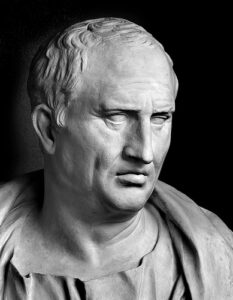Cicero | Biography, Philosophy, Writings, Books, Death, & Facts
Where did Cicero Grow Up?
Cicero was born in 106 BC. It is located in the small town of Alpinum, southeast of Rome. He was a smart kid from a wealthy family. He was taught by the best teachers and learned to read and write in Greek and Latin. He also made friends with Greek philosophers and poets.
As Cicero grew up, he gained a reputation as one of Rome’s brightest young men. He continued his studies of Roman law and trained as a public speaker. In Rome at that time, giving a good speech (also called an oratorio) was considered an art. Cicero becomes the greatest orator in Roman history.
Cicero Overview:
| Occupation | Roman Politician and Orator |
| Full name | Marcus Tullius Cicero, Helvia |
| Born | January 3, 106 BC in Arpinum, Italy |
| Died | December 7, 43 BC in Formia, Italy |
| Best known for | Being the greatest speaker in the history of Rome |
Biography of Cicero:
Cicero’s Friends
Cicero made two lifelong friends among law students. It was Servius Rufus and Atticus. Both played key roles in advising and supporting Kicero throughout his career.
Early Political Career of Cicero
Cicero strongly believed in the Roman Republic. He hoped to climb the ladder of political office in the traditional way known as Crusus Honorum. He served briefly in the military before starting his career as a lawyer. He quickly became famous for taking on risky cases and winning lawsuits. He also earned the wrath of the Roman dictator Sulla.
His first political office was in 75 BC. Questor, Sicily. After that, he continued to climb the political ladder. He was born in 69 BC. Curule aedile and 66 BC. BC law officer. Cicero enjoyed great popularity. Not only did he win every election he ran in, he also consistently received the most votes from his entire group of candidates. Ancient Rome seldom achieved this.
Famous Law Case
When Cicero was the quaestor of Sicily, the people asked him to take action against their governor, the mighty Gaius Veres. Cicero had little chance of winning. Veles was in power and employed the best lawyer in all of Rome, Quintus Hortensius. However, Cicero saw the case as a challenge and agreed to undertake it.
Cicero visited Sicily and found evidence against Veles. and he brought one of the greatest cases ever heard in the courts of Rome. His speeches became legendary, and the incident made him known as the greatest orator in all of Rome. Cicero won the trial and became very popular among the Roman people.
Becoming Consul
In 63 BC Cicero was elected consul, the highest office in the Roman government. Cicero defeated the threat of overthrow of the Roman Republic during his consulship. For his courageous efforts, the Senate awarded him the title Patel Patriae, which means “Father of the Nation”.
Exiled from Rome
Throughout his political career, Cicero has watched the rise of Julius Caesar. Cicero feared Caesar’s rise to power. Cicero refused when Caesar asked him to join a powerful alliance. This made him an enemy of Caesar. Shortly thereafter, Caesar banished Cicero from Rome. He left Rome for one year and returned in 57 BC.
Civil War
When Julius Caesar fought Pompey, took control of the city, and became the dictator of Rome, Cicero fled Rome again. However, Caesar pardoned Cicero and allowed him to return home. Cicero did not disappoint when Caesar was 44 BC. He took control of the Senate and attempted to restore the Roman Republic.
Death of Cicero
Cicero became a staunch opponent of Mark Antonius, one of the influential men who wanted to succeed Caesar. When Mark Antonius ruled Rome with Octavianus and Lepidus, they went in search of their enemies. They found Cicero and killed him. His last words were, “Soldier, nothing you are doing is right, but try to kill me right.”
Interesting Facts about Cicero
His full name was Marcus Tullius Cicero.
The name Cicero means “chickpea”.
Cicero’s writings continued to influence writers for many years. Historians have learned much about Roman government and Roman thought from Cicero’s writings.
Two of Cicero’s common themes in his writings were “duty to the land” and “duty to men.”
Cicero’s head and hands were severed and nailed to the rostrum of the Roman Forum.
His wife Terentia was a wealthy and influential woman who helped him in his political career.
His son Marcus was born in 30 BC. Chief Consul.

